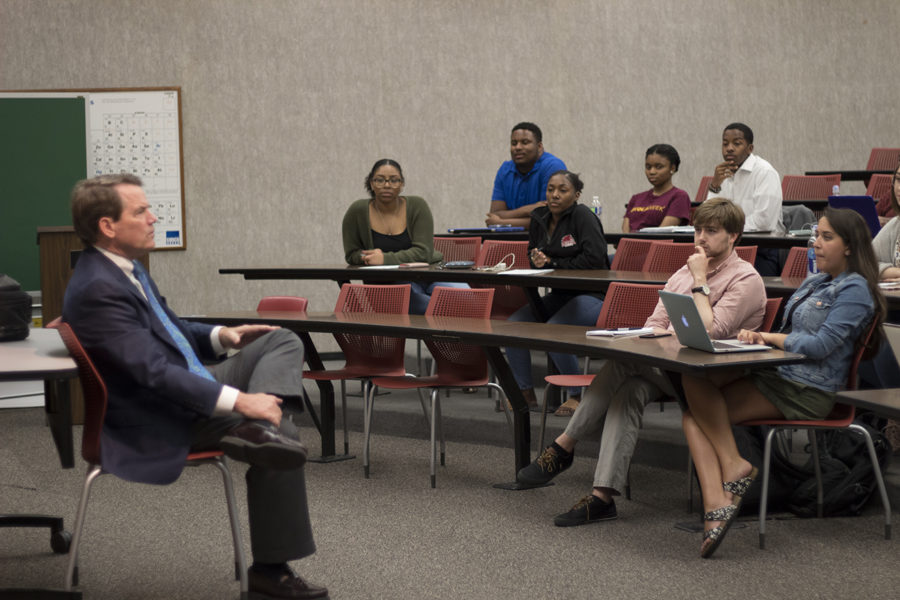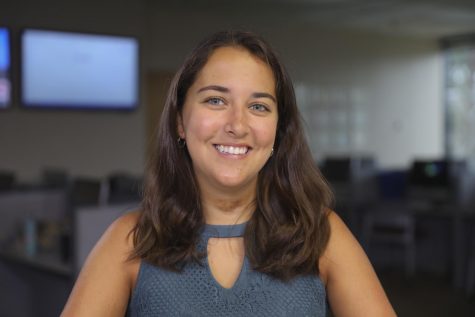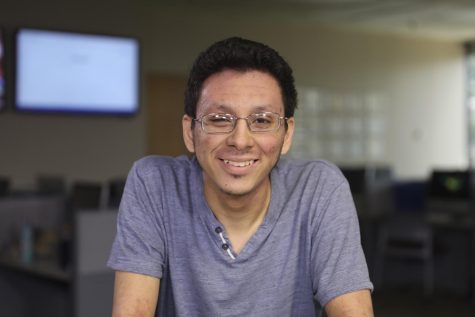Pastorek: Loyola’s future is strong
Acting Chief Operating Officer Paul Pastorek addresses students at a town hall meeting on April 18, 2018. Photo credit: Cristian Orellana
April 20, 2018
Paul Pastorek, acting chief operating officer, is optimistic about the future of Loyola.
“There is no risk at all that the university is going anywhere other than continuing to be the university that it is today,” Pastorek said.
Pastorek said Loyola is projected not to run a deficit by next year. If the university is successful in their goal of balancing the budget by July 2019, there will still be $100 million in the endowment and $120 million in the restricted endowment.
“If we did not have an endowment, I would be worried,” Pastorek said.
Pastorek, A’76 and J.D.’79, stepped into the position of chief operating officer on Wednesday, April 11, after David Borofsky unexpectedly resigned his positions as interim provost and chief operating officer. Pastorek took temporary leave from the board of trustees to fulfill this position.
Maria Calzada, former dean of the College of Arts and Sciences, has been named the new interim provost.
Financial Struggles
Through the end of 2017, Pastorek said the university was doing well financially. The university had improved by $11 million, which Pastorek said “solved half the problem.”
But at the start of 2018, the board was made aware of three financial challenges and surprises.
In early January, university officials were alerted that Loyola was being monitored and exposed to a possible probation status by the Southern Association of Colleges and Schools, the institution responsible for Loyola’s accreditation as a university.
In digging into the the accreditation situation, the board of trustees discovered that the university’s loss in fiscal year 2017 was greater than projected, and this loss had not been reported until around February of 2018. This discrepancy added an additional $6 million to the deficit, which currently stands at $17 million, according to Pastorek.
“The board takes complete responsibility for missing it,” Pastorek said at a faculty town hall on Thursday, April 12.
University officials initially believed that the deficit needed to be eliminated by July of 2018 in order to keep Loyola from being put on probation. However, a financial consultant later informed the board that Loyola only needs to show the Southern Association of Colleges and Schools that it has made ‘progress’ on resolving its debt.
“We know we are going to be financially successful,” Pastorek said. “The only doubt right now is whether or not the financial situation will trigger a probation by SACS.”
Pastorek, however, assured students that the university will not get to the point of losing accreditation.
“We’re not going to lose accreditation. Period. That is not a possibility,” he said.
Pastorek said the second financial obstacle was that it took longer than expected for the board to determine what the university’s financial situation would be at the end of the 2017-2018 school year.
The third surprise came from a belief that university spending had decreased by $1.8 million in 2017. Pastorek said the board was informed that these expense reductions were done. That was not the case.
The combination of these three challenges caused the board to grow concerned.
Pastorek said board members were forced to ask themselves “do we have all the horsepower we need to forecast any other problems out there?”
Borofsky and the Board
The board made Pastorek executive chairman in the wake of these challenges, wanting Borofsky to report directly to Pastorek. Pastorek said the board does not typically get involved with university operations, but in executive session, they do.
“We felt like David needed more help, frankly,” Pastorek said in a student town hall.
Pastorek said Borofsky told the board he was considering resigning about a week before he left.
“I have no criticism of his work or effort,” Pastorek said about Borofsky.
Pastorek said the board’s view was not that Borofsky was doing his job poorly, but that the university needed more horsepower and didn’t want any more surprises.
“David and I had gotten to be good friends. Pastorek said. “We began to work differently in that relationship over the next 4 weeks.”
Pastorek also said Borofsky gave him no reason for his resignation.
“I can’t explain why he made his decisions,” Pastorek said. “He didn’t explain his rationale. We have to live with his decision and move forward.”
Solving the Problems: Layoffs and Restructuring
At the student town hall on Wednesday, April 18, Pastorek said in order to balance the budget, there would probably be faculty laid off.
“There will be people who will lose their jobs,” Pastorek said.
However, he assured students that Loyola would not lose the character that makes the university unique and personalized.
Pastorek also plans to focus on money-saving opportunities in central operation restructuring.
“I expect we’re going to consolidate some of the administrative activities, change titles and not have as many vice presidents as we have now,” Pastorek said. “I also expect there will be some salary adjustments.”
Pastorek said the announcement about central office restructuring will be coming soon. That process will occur organically, according to Pastorek, but will happen before the end of the year so any potential financial benefits will impact next school year.
At the faculty town hall, Pastorek said he will also look at every college as a profit center in an attempt to save money. He has yet to investigate the direct costs of delivering each program, as well as any indirect costs.
“With my judgement, and armed with that information, we will be informed with what is working well and what is not,” Pastorek said. “It doesn’t mean we cut this program or that program. If you want to keep this program, we need to do something differently.”
Looking to the Future
Loyola will have a new university president in June of 2018 and Pastorek does not plan to stay in his position for the duration of Project Magis as he does not want to impinge on the incoming president.
The goal for the successful completion of Project Magis and the university’s financial struggle is for there to be no deficit by the end of July 2019 and for the university to not draw on the endowment.
During his time as chief operating officer, Pastorek hopes to be open and transparent. He said he will value student input.
At the student town hall, Pastorek spent two hours answering student questions and concerns.
“I will always tell the truth,” Pastorek said. “I believe the truth will set you free.”








